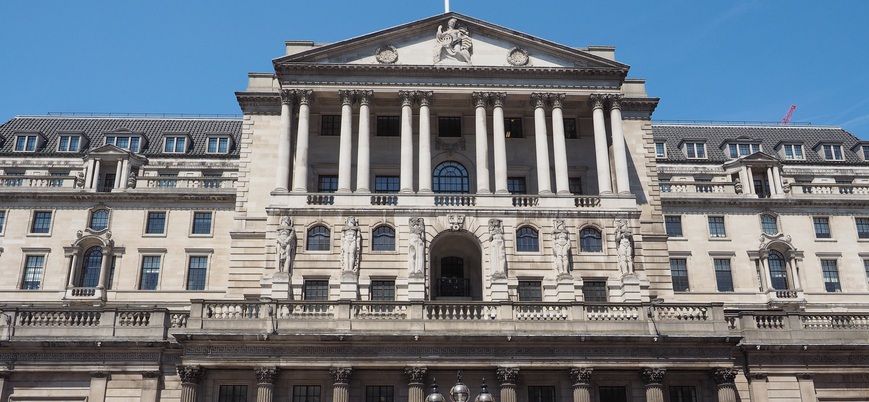Bank Of England

The Bank of England is the UK’s central bank. It started life in 1694 as a private bank set up by London merchants as a vehicle to lend money to the government and to deal with the national debt.
Its mandate has evolved over time. It wasn’t until 1844 that it began to operate like a modern central bank when the Bank Charter Act gave it the authority to issue currency in England and Wales.
Top Recommended Forex Brokers
BoE Monetary Policy
The gold standard was temporarily abandoned during World War I to provide flexibility in war funding and abandoned altogether in 1931. The bank was nationalized in 1946.
In 1997, the bank was provided the statutory power to set monetary policy rather than the government, affording it the political independence that is prized among most policymakers. A central bank independent of fiscal authority can better help in fighting inflation by resisting the temptation to keep interest rates too low for too long for political benefit. (Low interest rates are expansionary.)

Bank of England: Importance to Day Traders
G4 central banks – US Federal Reserve, European Central Bank, Bank of Japan, and Bank of England – make policy decisions that largely dictate the level of short-term real interest rates in an economy.
Nearly all assets are fundamentally priced off interest rates, making central bank policy instrumental to understanding where asset prices might be heading. The underlying cash flows that give stocks and bonds their value are discounted back to the present using an interest rate that is partially influenced by the rate set by central banks.
Interest Rates
Higher interest rates also impact demand for a currency, with higher-yielding currencies expected to appreciate against lower-yielding currencies, holding all else equal.
Certain commodities are impacted by interest rates. Higher rates in the US would be expected to decrease the value of gold, ceteris paribus, due to the historical relationship of the convertibility of gold into US dollars based on the Bretton Woods system (in place from 1945-1971). Gold and the US dollar share a -0.40 correlation (with +1.00 being a perfect positive correlation and -1.00 being a perfect negative correlation).
The same holds true regarding the US dollar and crude oil. Oil is often priced in dollars on the global market. Therefore, if the dollar depreciates against other currencies, this effectively makes oil cheaper in relative terms for non-USD countries. When something becomes cheaper, demand for it generally increases. Oil and the US dollar share a -0.30 correlation accordingly.
Bank of England Setup
The BoE’s Monetary Policy Committee (MPC) has nine members. Each month they vote to decide on whether a change in monetary policy is merited in order to achieve its inflation target, which is currently 2.0%. Each member has one vote, where a basic majority is needed to set policy.
How Its Policy Works
Monetary policy is primarily set through the interest rate mechanism, which the BoE deems the bank rate. The bank rate is the rate the BoE charges to domestic banks for very short-term loans. When the inflation rate is below target, the bank is inclined to keep interest rates at a low level, or lower them to help achieve it. When the inflation rate is above target, the bank will have a preference for raising rates.
When interest rates are low, banks can borrow more cheaply. This, in turn, results in lower borrowing rates in the private sector towards households and corporations. When corporations have lower borrowing costs, investments become cheaper. Some of this investment will go into human capital (new workers), lowering the unemployment rate.
At some point when an economy reaches a level of “full employment”, workers will obtain bargaining power for higher wages due to the lack of substitute workers in the economy. Corporations will pass off some degree of the wage increase in the form of higher prices for their goods or services, generating inflation.
To tamp down on pricing pressure in the economy, the central bank may raise rates to stabilize the inflation rate at their target.
Bank of England’s Role in Brexit
In June 2016, the UK voted to leave the European Union in a move termed “Brexit”. Some politicians view the move as a way for the UK to free itself from the unnecessary regulations pertaining to euro zone membership, while still coming to trade agreements to ensure an open and reciprocal flow of goods and labor.
In the near-term, there is concern that Brexit has undermined business confidence and delayed business investment decisions until greater clarity is obtained regarding the UK’s economy with respect to regulation, labor, and trade.
The BoE must manage inflationary pressure from the fall of the British pound (currently waning) that could nonetheless necessitate rate hikes to quell if it proves enduring. At the same time, any undermining of business and consumer confidence as a result of the vote could require rate cuts to help support the economy, putting the BoE in a unique position.



